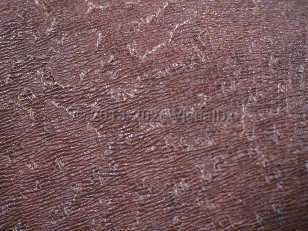Tinea imbricata in Adult
Alerts and Notices
Important News & Links
Synopsis

Tinea imbricata is a slowly progressive, chronic, superficial fungal infection caused by the dermatophyte Trichophyton concentricum, highly endemic to areas of Asia, the South Pacific, and Central and South America.
Lesions begin as small, brown, pruritic macules and papules and progress to concentric rings of scales. The infection usually begins in childhood, and progresses slowly over time. Over 75% of those affected will have lesions covering 50% or more of their skin surface. The lesions are quite pruritic, and the pruritus is aggravated by heat. Areas of lichenification develop after chronic excoriation. As this infection is superficial, patients do not have accompanying constitutional symptoms.
Risk factors include sharing an ancestry with endemic populations (travelers do not seem to develop this condition even after long stays and close contact), low socioeconomic class, and poor hygiene. Females are more commonly affected in the adult population; this sex ratio is reversed in children. Environmental exposures have not been linked to infection. A T-cell defect caused by an autosomal recessive trait has been suggested, but not proven.
Lesions begin as small, brown, pruritic macules and papules and progress to concentric rings of scales. The infection usually begins in childhood, and progresses slowly over time. Over 75% of those affected will have lesions covering 50% or more of their skin surface. The lesions are quite pruritic, and the pruritus is aggravated by heat. Areas of lichenification develop after chronic excoriation. As this infection is superficial, patients do not have accompanying constitutional symptoms.
Risk factors include sharing an ancestry with endemic populations (travelers do not seem to develop this condition even after long stays and close contact), low socioeconomic class, and poor hygiene. Females are more commonly affected in the adult population; this sex ratio is reversed in children. Environmental exposures have not been linked to infection. A T-cell defect caused by an autosomal recessive trait has been suggested, but not proven.
Codes
ICD10CM:
B35.5 – Tinea imbricata
SNOMEDCT:
240699006 – Tinea imbricata
B35.5 – Tinea imbricata
SNOMEDCT:
240699006 – Tinea imbricata
Look For
Subscription Required
Diagnostic Pearls
Subscription Required
Differential Diagnosis & Pitfalls

To perform a comparison, select diagnoses from the classic differential
Subscription Required
Best Tests
Subscription Required
Management Pearls
Subscription Required
Therapy
Subscription Required
References
Subscription Required
Last Updated:09/24/2018
Tinea imbricata in Adult

